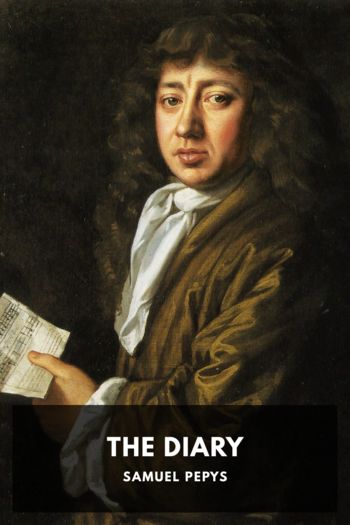The Diary - Samuel Pepys (red white and royal blue hardcover txt) 📗

- Author: Samuel Pepys
Book online «The Diary - Samuel Pepys (red white and royal blue hardcover txt) 📗». Author Samuel Pepys
Most probably at Norwood, in the parish of Lambeth, a place long famous as the resort of gipsies. Gipsy Hill is now a place of considerable size. ↩
Major Henry Nicholls, of Kilmaiden, Waterford, who undertook to clear the Medway of wrecks. ↩
The paper tubes for his eyes. See July 31st, ante. ↩
See July 24th, ante. ↩
William Ashburnham. ↩
He was probably of the family of Savage, seated at Frodsham, in Cheshire; and had been attached to the royal cause. According to Kennet (Chronicle, p. 869), he married the widow of Sir Richard Smith, one of the king’s privy council. —B. ↩
This refers to the letter on the affairs of the office which Pepys prepared, and respecting which, and the proceedings which grew out of it, so many references are made in future pages of the Diary. ↩
Of the Cinque Ports. ↩
A play by Thomas Heywood (see note 960). ↩
Sir Geofifry Palmer, Bart. He died at his house at Hampstead, May 1st, 1670. —B. ↩
William Acworth, storekeeper at Woolwich Dockyard. ↩
Poliander de Kirkhoven, Lord of Hemfleet, in Holland, married Katherine, widow of Henry, Lord Stanhope, eldest son of Philip, Earl of Chesterfield, who died vitâ patris. She was one of the four daughters and co-heirs of Thomas, Lord Wotton; and her son, Charles Henry Kirkhoven, here mentioned, was created Lord Wotton, of Wotton, in Kent, in 1650, by reason of his descent, and Earl of Bellemont, in Ireland, in 1670. He died without issue in 1682. —B. ↩
Belsyze House, in the parish of Hampstead, was for many years the residence of the Wood family, as lessees under the Dean and Chapter of Westminster, in whom the property is still vested. When Pepys visited the place, it was the chief seat of Charles Henry Kirkhoven, Lord Wotton, above mentioned. That mansion, long since pulled down, had become, in 1720, a house of public entertainment, and was much in vogue, and continued open as late as 1745. —B. The manor house was situated at the corner where Belsize Park Gardens and Belsize Grove meet. The site is now occupied by a building of residential flats. See Lysons’s Environs and Park’s History of Hampstead. ↩
In Great Queen Street. ↩
A mistake of Pepys’s. Colbert de Croissy, then in England, had himself been the French Plenipotentiary at Aix-la-Chapelle. —B. ↩
By Beaumont and Fletcher, and first published in 1615. Downes mentions the revival, but not the change of name. ↩
In the Pepysian Library is a MS. (No. 2242), entitled, “Papers conteyning my address to his Royal Highnesse James Duke of York, Lord High Admiral of England, etc., by letter dated the 20th of August, 1668, humbly tendering him my advice touching the present State of the Office of the Navy, with his Royal Highness’s proceedings upon the same, and their result.” ↩
The set of portraits known as “King Charles’s Beauties,” formerly in Windsor Castle, but now at Hampton Court. —B. ↩
The popular name of John Fox’s Acts and Monuments, first published in 1562–63. ↩
I.e., intimacy. ↩
Stuff of a sad colour. —B. ↩
Josiah Child and Thomas Papillon were partners in the Victualling business. ↩
In Upper Thames Street. ↩
The stones fell so fast that Pepys felt a sensation like seasickness! See September 14th, 1668, post. —B. ↩
On July 25th, 1668, a royal warrant was issued for taking down the walls of old St. Paul’s, removing the tower and choir, and clearing the ground for the foundation of the east end, with a view to the construction of a new choir for temporary use. The first stone of Wren’s building was not laid until June 21st, 1675. ↩
A copy of this letter is in the British Museum, Harl. MS. 6003. See July 24th, ante, and August 29th, post. In the Pepysian Collection are the following: An Inquisition, by his Royal Highness the Duke of York, when Lord High Admiral of England, into the Management of the Navy, 1668, with his Regulations thereon, fol. Also Mr. Pepys’s Defence of the same upon an Inquisition thereunto by Parliament, 1669, fol. —B. ↩
Sir Orlando Bridgman. ↩
Peter Heylin’s Cyprianus Anglicus, or the History of the Life and Death of William Laud, Archbishop of Canterbury, was first published in 1668. ↩
Although Holbein began working at Whitehall Palace in 1538, there is no mention of his work on the ceiling, and Wornum was puzzled by this entry. See Some Account of the Life and Works of Hans Holbein by R. N. Wornum, p. 309 (note) ↩
The picture here mentioned still adorns the Court Room at Barber Surgeons’ Hall, in Monkwell Street. It represents Henry VIII in the act of delivering the charter to the company, 1541, and contains eighteen figures. There has been much discussion over the merits of





Comments (0)